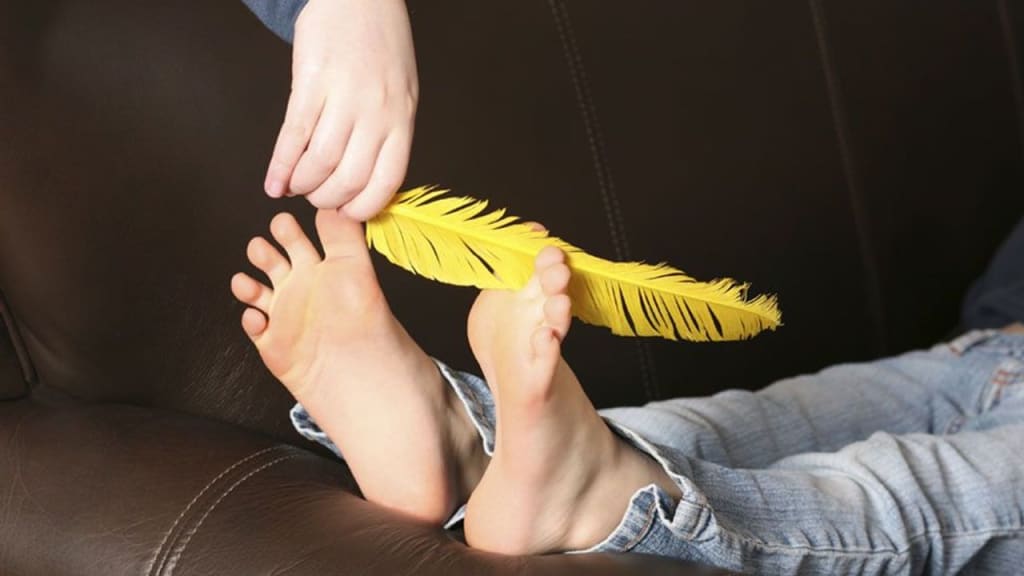Can You Tickle Yourself?
Unraveling the Mystery of Self-Touch Perception

Ever tried tickling yourself? That feather-light touch across your ribs, the mischievous anticipation building only to be met with... a disappointing lack of giggles. This seemingly simple act, a cornerstone of childhood laughter, holds a profound mystery: why can't we effectively tickle ourselves? The answer dives deep into the fascinating world of self-touch perception, sensory prediction, and the very fabric of our conscious experience.
Beyond the Giggles: A Symphony of Sensation
Tickling isn't just about laughter; it's a complex sensory dance. Light, repetitive touch on specific areas like the ribs or underarms activates a network of nerve fibers called C-tactile afferents. These tiny messengers carry signals to the spinal cord, ultimately reaching the brain's sensory processing centers. But the journey doesn't end there. Activated brain regions associated with pleasure, emotion, and laughter orchestrate the characteristic ticklish response. It's a symphony of touch, nerve signals, and brain activity culminating in those uncontrollable bursts of merriment.
The Self-Tickle Paradox: When Prediction Douses the Fun
So, why does this delightful symphony fall silent when we attempt self-tickling? Enter the enigmatic phenomenon of sensory prediction. When you initiate self-touch, your brain, that master of anticipation, knows exactly what's coming. It uses the motor command you sent to your muscles to predict the upcoming sensation. This prediction, like a dimmer switch, dampens the actual sensory signal arriving from your touch receptors. The brain essentially says, "Hey, I already know what that feels like, no need for the full show!" This dampened signal translates to a diminished ticklish response, leaving you with a puzzling lack of laughter.
Beyond the Party Pooper: The Crucial Role of Prediction
Sensory prediction may seem like a party pooper, but it plays a vital role in our daily lives. Imagine trying to walk down the street without being able to predict the consequences of your movements. You'd stumble over every pebble, flinch at every gust of wind, and be overwhelmed by a constant barrage of sensory information. By predicting how our actions will impact our senses, the brain filters out irrelevant details and allows us to focus on what matters. It's the difference between feeling the constant pressure of your clothes and noticing a spider crawling on your arm.
Can We Trick the Brain? Tickling the Unexpected
While a direct self-tickle might not work, researchers have found ways to bypass the brain's prediction mechanism. Using robotic arms or introducing delays between the motor command and the touch, they've been able to elicit ticklish sensations even when self-generated. This suggests that the key to tickling ourselves lies not in the touch itself, but in the element of surprise and the lack of anticipation.
Beyond the Lab: The Ripple Effects of Self-Touch Perception
Understanding self-tickle and sensory prediction goes beyond just explaining why we can't tickle ourselves silly. It sheds light on how our brains process sensory information, the role of prediction in perception, and even the development of social interactions. The ability to differentiate self-touch from external touch is crucial for understanding the intentions of others and building social bonds. It allows us to distinguish between a playful nudge from a friend and an unwelcome touch from a stranger.
The Enduring Mystery: What Lies Beyond the Tickle?
Despite these advancements, the full picture of self-tickle perception remains elusive. Are there individual differences in ticklishness? Can we train ourselves to be more (or less) ticklish? What about the psychological aspects of laughter and the social context of tickling? These are just some of the questions that continue to intrigue scientists and tickle our curiosity.
The Final Thought: Beyond the Giggles, a Window to the Brain
So, while tickling yourself may not trigger a laughter fest, the underlying science offers a fascinating glimpse into the intricate workings of our brain and sensory perception. It reminds us that even the simplest experiences can hold profound mysteries, waiting to be unraveled. And who knows, perhaps one day we'll unlock the secrets of self-tickling, leading to a future where everyone can finally enjoy a good giggle at their own expense. Until then, we can appreciate the wonder of sensory prediction and the complex dance of touch, laughter, and the human brain.





Comments (1)
Amazing